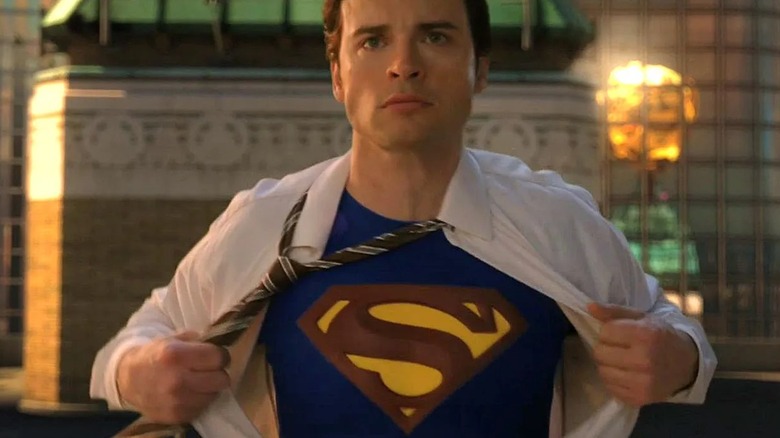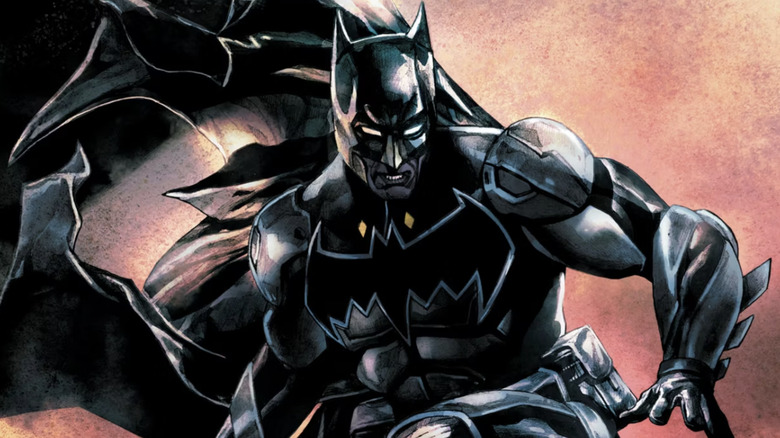Former Superman Actor Tom Welling Has One Regret About Smallville
"Smallville" began as a Superman origin story, showing Clark Kent (Tom Welling) growing up as a Kansas farm boy in the early aughts. His best friend? Lex Luthor (Michael Rosenbaum), of course! About halfway through, it became a straight-up Superman show that just didn't have the title or costume. Once you introduce the Justice League, you're out of the "prequel" period.
As this change happened, "Smallville" got very liberal about bringing in DC Comics characters — Clark even fought friggin' Darkseid in the 10th and final season! That makes two big absences stand out all the more. Batman and Wonder Woman, Superman's closest comrades and fellow parts of the DC Trinity, never show up in "Smallville." (Even though the show began as a Batman prequel, not a Superman one.)
At the 2024 TerrifiCon convention, Welling revealed it wasn't only fans who wanted Batman to pop in on "Smallville." Welling, though, said his ideal crossover would've been more low-key and free of any black, pointy-eared costumes:
"I always thought that we should have had Bruce Wayne pass through somehow. That would have been really cool to see. Like, you know how Clark always got into the Luthor Mansion with no problem? [What if] he had gone into Lex's office, and it was just as simple as Lex being like 'Good to meet you, Bruce,' or 'I'll talk to you later, Bruce,' and have him just walk out."
So, why did Welling's Clark Kent never cross paths with the Dark Knight?
How Smallville worked to fill its Batman shaped hole
During the 2000s, DC had a rule in place to limit how many movies/TV shows could use the same characters. Ergo, "Justice League Unlimited" was barred from using any Batman villains because of "The Batman," an unconnected cartoon airing at the same time. "The Batman" was in turn barred from using Robin until "Teen Titans" ended in 2006. And so on; the logic was that too many versions of the same characters would confuse people.
That's what kept Batman off of "Smallville." "Batman Begins" was in production during the early seasons of "Smallville" and premiered in 2005 between the show's fourth and fifth seasons. So, as "Smallville" creators Alfred Gough and Miles Millar explained in 2007, DC didn't want to dilute the uniqueness of the "Batman" film franchise.
Even so, Batman's shadow still lingers across "Smallville." The character of Adam Knight (Ian Somerhalder), introduced in "Smallville" season 3, was speculated at the time of airing to be a young Bruce Wayne. "Adam" was traveling the world with an alias and on his journey to becoming Batman, the fans said. That, of course, turned out to not be the case.
Meanwhile, the "Smallville" season 4 episode "Run" was about Clark meeting Bart Allen (Kyle Gallner), aka the speedster hero Impulse. Season 5 continued the trend with "Aqua" (featuring a pre "Reacher" Alan Ritchson as Aquaman) and "Cyborg" (starring the late Lee Thompson Young as Victor Stone). That paid off when "Smallville" season 6 introduced Oliver Queen/Green Arrow (Justin Hartley), who united Clark and the previous guest stars as the Justice League. Oliver wound up sticking around in the main cast for the show's last years, acting as the more pragmatic counterpart to Clark.
It's extremely easy to see how "Smallville" was using Green Arrow as a stand-in for the unavailable Batman. Green Arrow has always had a reputation as a Batman clone since he's also a rich vigilante with no superpowers (albeit with a motif inspired by Robin Hood instead of The Shadow). Outside of "Smallville," Oliver has never served as Superman's darker counterpart, but Batman sure has.
After "Smallville" ended, series writer Bryan Q. Miller continued the story as a comic book, "Smallville: Season 11." Free of both corporate edicts and the CW's budget restraints, Miller introduced all the heroes the TV show couldn't: Batman, Wonder Woman, Green Lantern, etc. If "Smallville" ever gets a nostalgia revival, maybe they can adapt those Batman-heavy comics and finally give Welling his wish.

